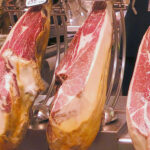The Iberian pig plays a crucial role in Spain’s rural economy and is a driving force for development in many regions of the country. Its breeding and processing generate a significant economic impact, which goes beyond the production of meat and sausages, consolidating itself as an essential sector for the sustainability of the rural environment.
Breeding in the dehesas
Firstly, the Iberian pig is mainly reared in dehesas, unique ecosystems that combine holm oaks, cork oaks and pastures. These farms are not only essential for the animal’s diet, especially in the case of acorn-fed pigs, but also contribute to the conservation of biodiversity and prevent desertification. Livestock farming in these areas ensures the maintenance of this valuable natural heritage.
Impact on rural areas
The industry linked to the Iberian pig generates direct and indirect employment in rural areas. From the farmers who look after the animals to the artisans who make products such as acorn-fed ham and other cured meats, the sector employs thousands of people. In addition, many small and medium-sized enterprises depend on this activity, fostering local development and preventing depopulation in areas that would otherwise lack economic opportunities.
Influence on the economy
The economic impact of the Iberian pig is also reflected in its contribution to exports. Derivative products, such as acorn-fed ham, are in great demand in international markets, positioning it as an ambassador of Spanish quality and tradition. This trade strengthens the national economy and increases the prestige of rural products abroad.
Finally, the Iberian pig represents a model of sustainable production. Its extensive rearing and the use of local natural resources minimise its environmental impact, while its added value allows it to generate wealth without compromising the ecological balance.
In conclusion, the Iberian pig is not only an icon of Spanish gastronomy, but also a fundamental pillar of the rural economy. Its breeding and processing boost local development, guarantee environmental sustainability and reinforce the identity of rural areas, ensuring a prosperous future for these communities.





